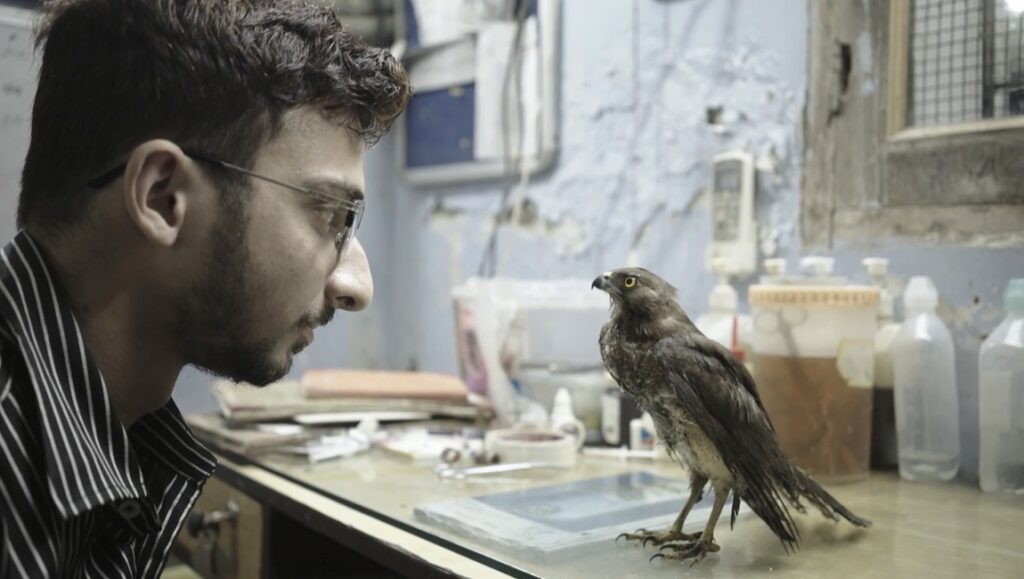All That Breathes offers a cogent diagnosis of our climate change predicament, suggesting a tentative hope for the future while recognizing the untenability of the present.
As climate change documentaries proliferate at a remarkably brisk pace, director Shaunak Sen’s new non-fiction film All That Breathes eschews blunt didacticism and functional, PowerPoint-style pedagogy for an altogether more low-key, elliptical approach. In Delhi, India, often referred to as the most polluted city on Earth, the Black Kite bird has become emblematic of mankind’s systematic obliteration of the natural world. These once ubiquitous creatures have evolved to live amongst urban detritus but now literally fall from the sky, dead or dying, at an alarming rate. Dubbed “The Kite Brothers,” Mohammad Saud and Nadeem Shahzad have made it their life’s mission to save as many of these birds as possible — a noble calling that becomes an increasingly precarious proposition as the film progresses. Sen has constructed his film as a kind of microcosm of the world at large, following Saud and Nadeem’s work at ground level while larger conflicts beyond the film’s scope continuously seep in around the margins. It ultimately results in a philosophical question — what good is it to save some birds when the entire world is collapsing? How Saud and Nadeem each navigate this specific dilemma becomes the main dramatic crux of the film.
Working with cinematographers Ben Bernhard and Riju Das (who took over for Bernhard when COVID restrictions created a scheduling conflict), Sen captures the city as a playground rife with animal activity. Long, languid pans at street level reveal teeming hordes of rats; monkeys crisscross the city’s dense architecture, with individual shots becoming a crazy patchwork of intersecting power lines and closely packed lattice works. Mosquitoes flit across stagnant pools of water, while snails, turtles, and even pigs wander in and out of the frame. Tilting the camera up, the screen fills with the wide open expanses of a dingy, gray sky, masses of Black Kites circling above. It’s a kind of city symphony, at least at first. We eventually settle in and observe Saud and Nadeem at work, as they collect injured and sick birds, examine them, clean their wounds, and hydrate them. The pair are chatty, explaining how they came to care for these animals, and how they funnel money from their day jobs into keeping their makeshift animal hospital (literally a basement space, at first) open. The birds are positioned as a symbol of sorts (although Sen smartly doesn’t force it too much). Denied attention at veterinarian offices because they are birds of prey, the Kites mirror Saud and Nadeem’s own outsider status as Muslims in a mostly Hindu society. Indeed, the government’s anti-Muslim immigration ban in 2019 and subsequent protest movement become a backdrop to the narrative proper, with Saud and Nadeem first joking about living in the aftermath of a nuclear conflict with Pakistan before riots become a frighteningly real danger right at their doorstep. Nadeem dreams of leaving Delhi and traveling the world, while Saud seems content to continue their work with the birds. Eventually, they reach a crossroads, as Nadeem is accepted for post-graduate studies in America and Saud prepares to open a new animal hospital with long-delayed funding from international grants. It’s a bittersweet ending, the brothers separating with only a faint promise of reuniting in the future. But the work continues, and while their paths may diverge, the duo seems to be unwavering in their commitment. Ultimately, then, All That Breathes suggests a tentative hope for the future while still recognizing that our current situation is tragically untenable. The film’s strength comes in understanding that the cognitive dissonance required to recognize both of these attitudes is perhaps the cogent diagnosis of our 21st-century dilemma.
Published as part of Sundance Film Festival 2022 — Dispatch 4.


Comments are closed.